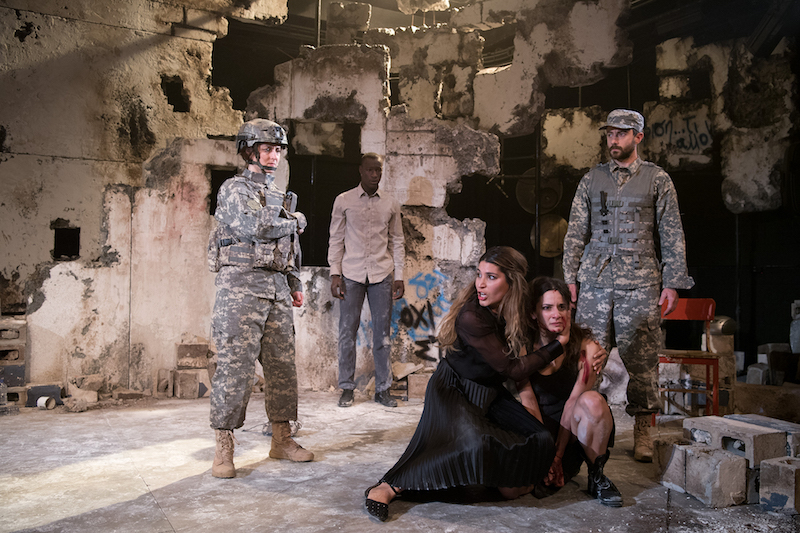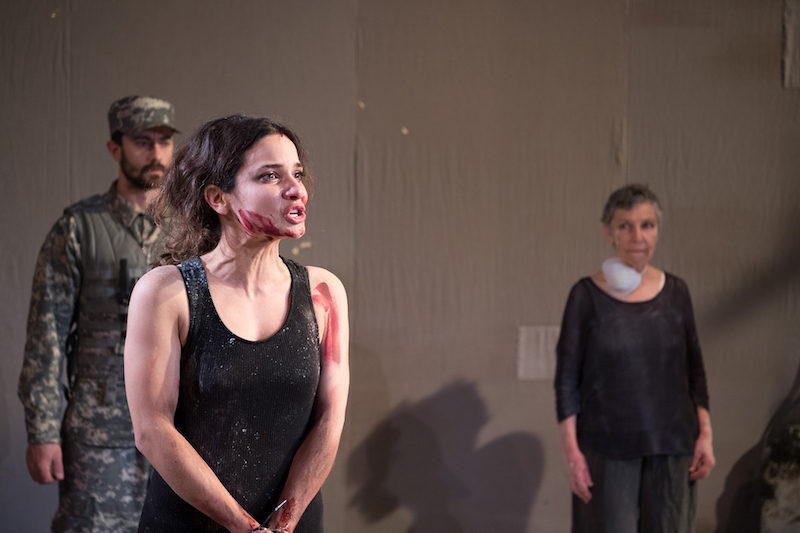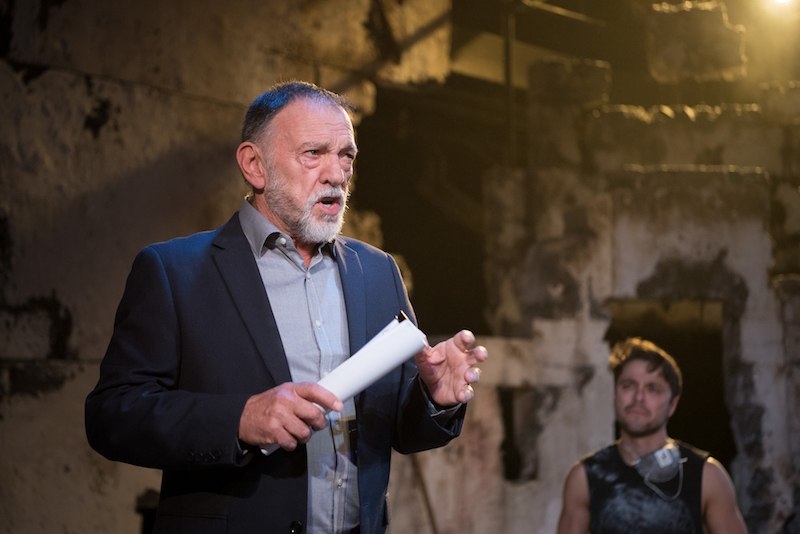★★★★½ Extraordinarily powerful theatre that feels urgent and timely, yet timeless.
Reginald Theatre, Seymour Centre, Sydney
October 11, 2016
From the unsettling crashing of drums at the start of the production to the aching strains of Bach’s cantata Ich habe genug (It is enough) at the shattering denouement, Sport for Jove’s production of Antigone is gripping theatre.
 Janine Watson, Elijah Williams, Louisa Mignone, Andrea Demetriades and Thomas Royce-Hampton. Photo by Marnya Rothe
Janine Watson, Elijah Williams, Louisa Mignone, Andrea Demetriades and Thomas Royce-Hampton. Photo by Marnya Rothe
First performed two millennia ago around 441BC in an Athenian amphitheatre, this new adaptation of Sophocles’ tragedy by Damien Ryan (who also co-directs with Terry Karabelas) feels urgent and desperately topical, while remaining faithful to the original source material.
Twin brothers, Polynikes and Eteocles, sons of Oedipus, lie dead on the battle field, having fought each other in a civil war. Oedipus’ brother Creon, now the ruler, orders that Eteocles be buried with full military honours, while the body of Polynikes – who fought against Thebes – be left to rot in the sun. Anyone who tries to bury him will be killed. In defiance of the decree, Antigone, sister of the brothers, buries Polynikes, setting up a struggle with Creon and the state, which leads inexorably to ever-more tragedy.
Writing in the theatre programme, Ryan says he was inspired to develop a new production of the play when he heard a radio report about the refusal of cemeteries in the US to bury Boston Marathon bomber Tamerlan Tsarnaev. When his body was moved to a funeral home near Massachusetts, crowds gathered outside to protest against it being interred. Other contemporary news stories tell a similar tale to Antigone. In 2015, a truck carrying the bodies of 13 Kurdish men and women who had died fighting against ISIS, was refused permission to cross into Turkey. Grieving families protested for 10 days in 50-degree heat until they were finally allowed to bury their dead.
As Ryan writes: “Sophocles captures a burning moral question that has intensified every year since he wrote it. How do we reconcile our hatred and fear or those who seek to hurt us, and how should we punish our enemies? The play is not purely about burying a body, it is about how we bury our own hatred, how we resolve it, salve it, cure it, perhaps even forgive it and reconcile it back to peace.”
 Andrea Demetriades with Thomas Royce-Hampton and Anna Volska. Photo by Marnya Rothe
Andrea Demetriades with Thomas Royce-Hampton and Anna Volska. Photo by Marnya Rothe
This new Sport for Jove production takes place in a recognisably contemporary world, which bring to mind conflict zones such as Syria and Iraq. Melanie Liertz’s set design vividly evokes a bombed city in ruins, without power or running water, while Ryan’s beautifully written adaptation skilfully melds the poetic force of an ancient tragedy with contemporary language (including some Greek) and the modern setting.
Ryan has changed the plot slightly so that the brothers are no longer fighting over the throne. Instead, Polynikes has been involved with a violent, fundamentalist group – though Creon cannot bring himself to use the word “terrorist” – and has been seen posing in brutal videos featuring decapitation, while there are also reports of him chopping off women’s hands in captured towns.
Ryan also puts a strong focus on children becoming adults without being allowed to mature, the result being a young male culture shaped by violence and conflict. In another change, the sentry is a young woman, Pia (Janine Watson), through whom Ryan introduces a vein of comedy, which lends some welcome light-relief, while at the same time intensifying the contrasting darkness of the unfolding tragedy.
 William Zappa. Photo by Marnya Rothe
William Zappa. Photo by Marnya Rothe
The performances are marvellous across the board. William Zappa is magnificent as Creon. Often, the character is depicted as the out-and-out villain of the piece. Here, though Creon eventually realises his terrible mistake, Ryan and Karabelas keep our sympathies shifting between Creon and Antigone. We may not agree with Creon – and he certainly starts to lose us with his embrace of democracy “tomorrow” – but we understand his stance. Zappa gives us a richly contoured character whose journey from confident, beaming authority to increasing self-doubt and then emotional disintegration is brilliantly done.
Andrea Demetriades is also compelling as Antigone, by turns fiercely feisty, vulnerable and passionate. Her sadness at the things she won’t experience in life is very moving, as she takes refuge in the arms of Haemon (Creon’s son) while facing death.
Ryan has retained the chorus, powerfully led by Fiona Press, who speak both as individuals and as a collective voice, with some of their movement choreographed in unison – all very effectively done. There are also persuasive performances from Louisa Mignone as Antigone’s sister Ismene who is too scared to help bury Polynikes but stands by her sister when she is arrested, Joseph Del Re as Haemon and Deborah Galanos as Creon’s wife Eurydice, here a surgeon in what remains of the hospital. Watson is very funny as the sentry, Anna Volska is a hip Tiresias, the blind prophet, accompanied by a character simply called “The Boy”, played by Marie Kumara and Elijah Williams, who underlies the theme of boy soldiers and the adults they become. Thomas Royce-Hampton, who completes the fine cast, also plays live percussion.
Every element of this insightful, immaculately realised production (which is beautifully lit by Matt Cox) comes together perfectly to create a gripping piece of theatre that feels relevant today without being either forced or gimicky.
Antigone plays at the Seymour Centre until October 22, then at Canberra Theatre Centre, October 27 – 29, and Riverside Theatres, Parramatta, November 9 – 12











Comments
Log in to join the conversation.